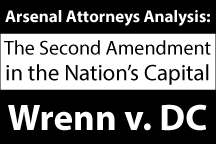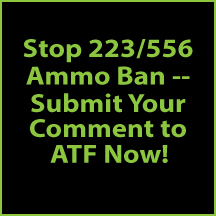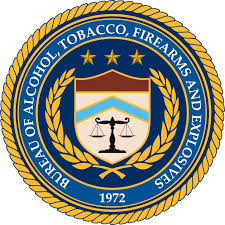 Arsenal Attorneys: A National Firm - Offices in Virginia and California
Arsenal Attorneys: A National Firm - Offices in Virginia and California
Arsenal Attorneys: A National Firm - Offices in Virginia and California
Arsenal Attorneys: A National Firm - Offices in Virginia and California
CONTACT US TODAY
800.819.0608
WAMU Features Arsenal Attorneys' George Lyon on DC Concealed Carry Permits
 WAMU (American University public radio in Washington, DC) featured Arsenal Attorneys' George Lyon in its reporting on May 21, 2015 regarding concealed carry permits in the District of Columbia. The report quoted Mr. Lyon's blog for Arsenal Attorneys in which he analyzed the US District Court's decision in Wrenn v. DC. Arsenal Attorneys advise clients on DC firearms law, including the many nonresidents who are concerned about the lawful possession of firearms in DC. Mr. Lyon is one of the few firearms instructors certified by the District of Columbia to provide the required firearms training for carry permits in DC, and Arsenal Attorneys offers the legal training also required for obtaining a DC permit. Arsenal Attorneys will soon announce a seminar on DC carry permits, including the required legal training, to be held at the headquarters of the National Rifle Association in Fairfax, VA.
WAMU (American University public radio in Washington, DC) featured Arsenal Attorneys' George Lyon in its reporting on May 21, 2015 regarding concealed carry permits in the District of Columbia. The report quoted Mr. Lyon's blog for Arsenal Attorneys in which he analyzed the US District Court's decision in Wrenn v. DC. Arsenal Attorneys advise clients on DC firearms law, including the many nonresidents who are concerned about the lawful possession of firearms in DC. Mr. Lyon is one of the few firearms instructors certified by the District of Columbia to provide the required firearms training for carry permits in DC, and Arsenal Attorneys offers the legal training also required for obtaining a DC permit. Arsenal Attorneys will soon announce a seminar on DC carry permits, including the required legal training, to be held at the headquarters of the National Rifle Association in Fairfax, VA.
Wrenn v. DC, a welcome decision, but probably not the last word.
By, George L. Lyon, Jr*
 In a decision released yesterday, Senior Federal District Court Judge Frederick Scullin, preliminarily enjoined DC’s requirement that concealed pistol license applicants demonstrate a good reason to fear injury or show other proper reason to obtain a license to carry a concealed handgun in DC. The name of the case is Wrenn v. District of Columbia. It is important to understand what this ruling does and does not do. What the ruling does not do is end the case. A preliminary injunction is a ruling from a judge at an early stage of the proceeding that a litigant has made a strong case that he will ultimately prevail, that he will be irreparably injured if the injunction is not issued, that the defendant will not suffer irreparable injury from the injunction and that the public interest will benefit from issuance of the injunction. This four part test is somewhat flexible so that a very strong showing on one element of the test can compensate for a somewhat weaker showing on another element. In this case, Judge Scullin found, in line with his prior decision in Palmer v. District of Columbia, that the right to carry a handgun for self-protection is protected by the Second Amendment to the United States Constitution. (In the spirit of full disclosure, I was a plaintiff in the Palmer case.) He found that DC’s requirement that individuals demonstrate a good reason to fear injury or other “proper reason,” such as carrying large sums of money or other valuables, amounted to a burden on this right as applied to those persons who could not make such a demonstration. He was thus required to analyze whether this burden comported with the Second Amendment. In doing so he rejected DC’s argument that its restriction on carrying was longstanding of the type that the Supreme Court in the Heller case suggested were presumptively constitutional. Despite a number of laws touching on various aspects of firearms carry, he stated that DC had presented no historical evidence that the good cause requirement was longstanding. Furthermore, he agreed with plaintiffs that even if longstanding, the requirement amounts to a total ban on carry for the vast majority of law abiding citizens and thus impinges on the Second Amendment’s right to bear arms. Having made that determination, the court applied what it called “intermediate scrutiny” to evaluate whether DC had shown that the restriction on carry rights was substantially related to an “important governmental interest,” in this case preventing crime and protecting public safety. The court stated that DC had to show that it did not burden the right to carry more than necessary to further this important interest. The court held, however, that the District did not establish that its carry restriction reasonably related to its interest in preventing crime and protecting public safety. Thus, the court found that the plaintiffs were likely to prevail in the case. With respect to the requirement that plaintiffs suffer irreparable harm, the court found that the Second Amendment protects intangible and unquantifiable rights, similar to the First Amendment, and that denial of Second Amendment rights thus create harm for which damages cannot compensate the victims. The court therefore found that the plaintiffs would suffer irreparable injury from denial of the requested preliminary injunction. Conversely, the court found that DC had not shown it would suffer irreparable damage. It quoted DC Police Chief Cathy Lanier’s comment that law abiding citizens that register guns and follow the rules “are not our concern.” For similar reasons, the court found that the public interest favored granting the preliminary injunction rather than denying it. Judge Scullin’s opinion, while not perfect, is another important step toward full judicial recognition of the Second Amendment. But it will not be the last. You can expect DC to seek a stay of this decision. A stay is an order that holds the decision in abeyance. Judge Scullin could issue a stay himself, or DC could request the United States Court of Appeals for the DC Circuit to issue such a stay. And it is very likely DC will appeal the decision to the DC Circuit. In any event, the case will proceed before Judge Scullin on the request for a permanent injunction and DC will have the opportunity once again to justify its restriction on carry rights. So should you immediately go down to the DC gun control office and submit your application? That is a decision only you can make, but understand that we are likely years away from a carry law in the District of Columbia that comports with the Second Amendment. We will keep you advised on the course of this litigation and we stand ready to assist you both with the application procedure and with the required DC training should you wish to apply for a DC carry license.
In a decision released yesterday, Senior Federal District Court Judge Frederick Scullin, preliminarily enjoined DC’s requirement that concealed pistol license applicants demonstrate a good reason to fear injury or show other proper reason to obtain a license to carry a concealed handgun in DC. The name of the case is Wrenn v. District of Columbia. It is important to understand what this ruling does and does not do. What the ruling does not do is end the case. A preliminary injunction is a ruling from a judge at an early stage of the proceeding that a litigant has made a strong case that he will ultimately prevail, that he will be irreparably injured if the injunction is not issued, that the defendant will not suffer irreparable injury from the injunction and that the public interest will benefit from issuance of the injunction. This four part test is somewhat flexible so that a very strong showing on one element of the test can compensate for a somewhat weaker showing on another element. In this case, Judge Scullin found, in line with his prior decision in Palmer v. District of Columbia, that the right to carry a handgun for self-protection is protected by the Second Amendment to the United States Constitution. (In the spirit of full disclosure, I was a plaintiff in the Palmer case.) He found that DC’s requirement that individuals demonstrate a good reason to fear injury or other “proper reason,” such as carrying large sums of money or other valuables, amounted to a burden on this right as applied to those persons who could not make such a demonstration. He was thus required to analyze whether this burden comported with the Second Amendment. In doing so he rejected DC’s argument that its restriction on carrying was longstanding of the type that the Supreme Court in the Heller case suggested were presumptively constitutional. Despite a number of laws touching on various aspects of firearms carry, he stated that DC had presented no historical evidence that the good cause requirement was longstanding. Furthermore, he agreed with plaintiffs that even if longstanding, the requirement amounts to a total ban on carry for the vast majority of law abiding citizens and thus impinges on the Second Amendment’s right to bear arms. Having made that determination, the court applied what it called “intermediate scrutiny” to evaluate whether DC had shown that the restriction on carry rights was substantially related to an “important governmental interest,” in this case preventing crime and protecting public safety. The court stated that DC had to show that it did not burden the right to carry more than necessary to further this important interest. The court held, however, that the District did not establish that its carry restriction reasonably related to its interest in preventing crime and protecting public safety. Thus, the court found that the plaintiffs were likely to prevail in the case. With respect to the requirement that plaintiffs suffer irreparable harm, the court found that the Second Amendment protects intangible and unquantifiable rights, similar to the First Amendment, and that denial of Second Amendment rights thus create harm for which damages cannot compensate the victims. The court therefore found that the plaintiffs would suffer irreparable injury from denial of the requested preliminary injunction. Conversely, the court found that DC had not shown it would suffer irreparable damage. It quoted DC Police Chief Cathy Lanier’s comment that law abiding citizens that register guns and follow the rules “are not our concern.” For similar reasons, the court found that the public interest favored granting the preliminary injunction rather than denying it. Judge Scullin’s opinion, while not perfect, is another important step toward full judicial recognition of the Second Amendment. But it will not be the last. You can expect DC to seek a stay of this decision. A stay is an order that holds the decision in abeyance. Judge Scullin could issue a stay himself, or DC could request the United States Court of Appeals for the DC Circuit to issue such a stay. And it is very likely DC will appeal the decision to the DC Circuit. In any event, the case will proceed before Judge Scullin on the request for a permanent injunction and DC will have the opportunity once again to justify its restriction on carry rights. So should you immediately go down to the DC gun control office and submit your application? That is a decision only you can make, but understand that we are likely years away from a carry law in the District of Columbia that comports with the Second Amendment. We will keep you advised on the course of this litigation and we stand ready to assist you both with the application procedure and with the required DC training should you wish to apply for a DC carry license.
* Mr. Lyon is a lawyer with Arsenal Attorneys and his professional biography can be found here.
Firearms Law: Seminars for Gun Owners at NRA Hqs by Arsenal Attorneys
Arsenal Attorneys will present two law seminars for gun owners at NRA Headquarters in Fairfax, Virginia. Our seminars present knowledge every gun owner should know concerning their use and possession of firearms both in emergencies and in everday life. Our seminars are presented by a team of lawyers, including a criminal defense attorney and a former prosecutor.
The next seminar, "Essentials of Self-Defense Law", will take place Tuesday, April 28, 2015, 6:30 pm to 9:30 pm. This program will explain when the use of force is justififed for self-protection and when it is not. The seminar will also explain the legal implications of using a firearm in self-defense and how the criminal justice system handles these cases.
On Saturday, May 9, Arsenal Attorneys will present "Where are your guns allowed?" This seminar will present the varied laws regulating where and how firearms may be carried or transported. The topics will include the different laws for possessing firearms in various jurisdictions and locations, such as schools, airports, federal facilities, parks, and more. The program will also include practical advice, such as the transport of firearms on airliners and in other modes of interstate travel.
Each seminar requires pre-enrollment at https://www.arsenalattorneys.com/law-seminar.
223/556 Ammo Ban Update: Submit Your Comments Now to Stop ATF Rewrite of the Gun Control Act of 1968
By Michael W. Zarlenga*
 As I follow this story, I read the Bureau of Alcohol, Tobacco, Firearms and Explosives (ATF) Facebook page. I was shocked at what appears to be the ATF attempting to rewrite the plain language of the Gun Control Act of 1968 (GCA). The following is posted on the ATF Facebook page:
As I follow this story, I read the Bureau of Alcohol, Tobacco, Firearms and Explosives (ATF) Facebook page. I was shocked at what appears to be the ATF attempting to rewrite the plain language of the Gun Control Act of 1968 (GCA). The following is posted on the ATF Facebook page:
It is important to note that the limitation on ‘armor piercing ammunition’ in the GCA does not apply to projectiles manufactured exclusively from non-restricted materials such as copper and lead; it only applies to projectiles that include the specifically restricted materials, and can be used in a handgun. The framework will not apply to projectiles manufactured exclusively from non-restricted materials; licensed manufacturers will continue to be free to manufacture such projectiles without seeking an exemption.
So why was I shocked? Below is the definition of “armor piercing” contained in the GCA, Section 18 USC 921(a)(17)(B) of the U.S. Code:
(B) The term “armor piercing ammunition” means:
(i) a projectile or projectile core which may be used in a handgun and which is constructed entirely (excluding the presence of traces of other substances) from one or a combination of tungsten alloys, steel, iron, brass, bronze, beryllium copper, or depleted uranium ... "
Note how the ATF explained the GCA on its Facebook page. The ATF states that the “GCA does not apply to projectiles manufactured exclusively from non-restricted materials.” This is technically correct as projectiles not constructed of restricted material are not subject to the GCA. However, it completely misses the point of the GCA. The GCA only applies to projectiles “constructed entirely from one or a combination of” restricted material. Contrary to the apparent position of the ATF, a plain reading of the GCA makes clear that if a projectile contains a core made of non-restricted material (other than a trace amount) and a restricted material, the projectile does not meet the definition of armor piercing.
Guidance for Public Comment on ATF Plan to Ban Common 223/5.56 NATO Ammunition as Armor Piercing
 By Michael W. Zarlenga*
By Michael W. Zarlenga*
[Note: Since this posting, we've provided an update at this link.] The Bureau of Alcohol, Tobacco, Firearms and Explosives (ATF) has announced it is seeking to ban the common M855 ball ammunition as “armor piercing ammunition.” The public has the opportunity to submit public comments in response to ATF’s proposed “framework” for determining whether to grant a “sporting purpose” exemption to armor piercing ammunition. If you are an industry employee, target shooter, or gun owner, you should contact the ATF to oppose the ban. You should also contact your Senator and Congressman and inform them of the ATF’s attempt to expand their authority beyond what is permitted by law.
The ATF is attempting to ban the 5.56×45mm NATO SS109/M855 cartridge (NATO: SS109; U.S.: M855) with the standard 62 gr. lead core bullet with steel penetrator because firearms in that caliber are now widely offered in the configuration of a handgun (i.e. pistol). The ATF claims authority for this ban under power granted to it by the Law Enforcement Officers Protection Act of 1986 (LEOPA), which amended the Gun Control Act of 1968 (GCA). These provisions appear at 18 USC 921(a)(17), which provides:
Protecting Nontraditional Assets: from Art to Armaments
 On Friday February 20, Arsenal Attorney's Managing Attorney, Matthew Bergstrom, spoke to the Central Virginia Chapter of the Financial Planners Association in Richmond, Virginia. Mr. Bergstrom addressed the special challenges of handling nontraditional assets in legal matters, particularly in estate planning.
On Friday February 20, Arsenal Attorney's Managing Attorney, Matthew Bergstrom, spoke to the Central Virginia Chapter of the Financial Planners Association in Richmond, Virginia. Mr. Bergstrom addressed the special challenges of handling nontraditional assets in legal matters, particularly in estate planning.
Whether your investment portfolio or personal assets include art, animals, or armaments, you might not think to raise such topics with your attorney. It is the policy of Arsenal Attorneys to raise these issues in the event you do own something that requires special care and attention. We consider these matters from various standpoints, including: wealth management, asset protection, preservation, risk, and inheritance, among others. We particularly focus on the needs of the parties in the future who might become involved with your nontraditional assets, such as executors, successor trustees, heirs, and beneficiaries.
Will you or your loved ones understand the care and handling of your assets? For example, might an antique require periodic restoration? Will firearms require compliance with complex state and federal laws? Are funds needed for the maintenance of your pets? How would passwords to digital media be disclosed?
Contact us to discuss your special concerns regarding nontraditional assets. Arsenal Attorney's team of attorneys and our network of subject matter experts are ready to help you and the next generation enjoy your nontraditional assets.
